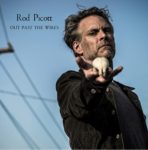 Sure, the melodies and the arrangements are important; they must be if Neilson Hubbard and Will Kimbrough are involved, but with Rod Picott, the stories are always front and centre. “Out Past the Wires” is no exception, in fact it takes the narratives a step further. In addition to the album, Rod’s also publishing a book exploring the stories of some of the characters that appear on the album. Listen to the beautifully-crafted vignettes studded through the twenty-two songs (that’s right twenty-two songs; hope you brought a packed lunch for this one) and you feel that you’re just scratching the surface of their lives. The ageing racer in “Primer Gray”, the teen queen in “Hard Luck Baby”, the struggling musician in “Straight Job” and the labourer in “Store Bought”; you really want to know the back story, or where they move on to outside this particular moment. Listen to the album(s) and it all makes perfect sense.
Sure, the melodies and the arrangements are important; they must be if Neilson Hubbard and Will Kimbrough are involved, but with Rod Picott, the stories are always front and centre. “Out Past the Wires” is no exception, in fact it takes the narratives a step further. In addition to the album, Rod’s also publishing a book exploring the stories of some of the characters that appear on the album. Listen to the beautifully-crafted vignettes studded through the twenty-two songs (that’s right twenty-two songs; hope you brought a packed lunch for this one) and you feel that you’re just scratching the surface of their lives. The ageing racer in “Primer Gray”, the teen queen in “Hard Luck Baby”, the struggling musician in “Straight Job” and the labourer in “Store Bought”; you really want to know the back story, or where they move on to outside this particular moment. Listen to the album(s) and it all makes perfect sense.
Credit where it’s due to the other musicians on the album as well (Lex Price, Evan Hutchings and Kris Donegan) for creating settings that allow the songs to sparkle and shine, whether they’re sprinkled with underplayed atmospherics or a full-on, full-band workout. Whether the backing is a gently finger-picked acoustic, intertwined electric guitars, Lennonesque harmonica or a brooding rock feel with heavily-reverbed guitar. And then there’s Rod Picott’s voice, weaving its raw fibres through the fabric of the songs to conjure up passion, pain and even aspiration. He even manages to ease back to mellow with a touch of falsetto on “Blanket of Stars”.
At a time when ten-song albums are becoming increasingly common and EP or double EP is rearing its ugly head, it’s an utterly audacious move to release a double album, but it works. The standard of the songs is uniformly high across he two discs, but I’m going to hit you with a few that caught my personal sweet spot. “Primer Gray” evokes “Nebraska”/”The River” era Springsteen with the battered car symbolising the central character, “Hard Luck Baby” spins the downward spiral from teen beauty into drudgery and “The Shape of You” is a lovely poetic take on the void left in a life when a relationship ends. Listen for yourself; the choice is huge and I won’t be offended if you disagree with my choices.
“Out Past the Wires” is released on Friday February 16th on Welding Rod Records (CD, LP or download).
If you want to see Rod live, he’s touring Europe and the UK from March.
Here’s a little taster for you:
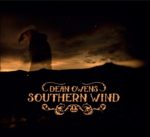 It’s about time we had a new album from Dean Owens, isn’t it? It’s been two and a half years since “Into the Sea”, not that he’s been resting on his considerable laurels, that’s not his style. He’s been involved in production, collaboration and loads of touring and somehow managed to fit the “Southern Wind” sessions in to the mix. Although the album’s released under Dean’s name, it’s fair to say that it’s more of a collaboration with his guitar-slinger of choice (and mine), Will Kimbrough. The musicians and production team are Dean’s regular Nashville crew and they all do the usual superb job, but the creative thread running through the centre is “Southern Wind” is the Owens/Kimbrough partnership.
It’s about time we had a new album from Dean Owens, isn’t it? It’s been two and a half years since “Into the Sea”, not that he’s been resting on his considerable laurels, that’s not his style. He’s been involved in production, collaboration and loads of touring and somehow managed to fit the “Southern Wind” sessions in to the mix. Although the album’s released under Dean’s name, it’s fair to say that it’s more of a collaboration with his guitar-slinger of choice (and mine), Will Kimbrough. The musicians and production team are Dean’s regular Nashville crew and they all do the usual superb job, but the creative thread running through the centre is “Southern Wind” is the Owens/Kimbrough partnership.
They bonded over, among other things, a mutual love of Ronnie Lane and that’s the starting point for the album. “Last Song”, the album’s opener, wouldn’t feel out of place on any of the Faces albums with its loose rock feel and characteristic melodic basslines. It’s an homage and a tribute and it’s loads of fun; proof that Dean and Will can write an upbeat song (and it’s not the only one on the album).
Although the title track and “No Way Around It” have a slightly menacing Delta feel, “Southern Wind” still has very strong sense of time and place in twenty-first century Scotland and the stories of its inhabitants in difficult social and personal circumstances. “Elvis Was my Brother”, “When the Whisky’s not Enough” and “Bad News” all fit into this category, while “Famous Last Words” is a typical Dean Owens slant on the longest day of the year; that things can only get worse from here on in. Nights are fair drawin’ in, eh? “Anything Helps”, another Will Kimbrough co-write, fits neatly in to this little group with its Ronnie Lane solo era stylings and one of the album’s greatest lines ‘Took a swing at life and missed’.
There’s a place here for the intensely personal as well; the gorgeous “Madeira Street” looks back to more innocent times through a prism of grief and celebration, while “Louisville Lip” celebrates the life of Dean’s hero Muhammad Ali. “Mother” is a light-hearted sixties pastiche (just imagine it on the soundtrack to “Inspector George Gently” or “Call the Midwife”) with clipped guitar and a hint of Phil and Don, while “Love Prevails”, closing the album, channels The Chordettes’ “Born to be With You”, particularly in Will Kimbrough’s laid-back solo.
Dean Owens has that rare poetic ability to fashion perfect songs from life’s everyday stories and the ability to deliver powerful, plaintive performances of those songs. On this album, the partnership with Will Kimbrough and producer Neilson Hubbard has created perfect settings for both the melancholy and the upbeat songs. ”Southern Wind” is a fine piece of work from one of Scotland’s finest songwriters.
“Southern Wind” is released on Friday February 16 on At the Helm Records.
And here’s a special little treat for you:
 It’s about time for one of those disclaimers again. This is all purely subjective and it’s one person’s response to an album. Felt I had to say that because I had such an unusual response to this Rick Shea album. The first half of the album drifted gently over me, leaving no impression at all, whereas the second half, well, it didn’t get right up in my face and scream at me, but it certainly shouted ‘Howdy’ from across the road. And I’m not saying there’s anything wrong with the first five songs, just that they didn’t light any fires under me; even “Hold on Jake”, a guitar-driven zydeco twelve-bar didn’t quite cut it.
It’s about time for one of those disclaimers again. This is all purely subjective and it’s one person’s response to an album. Felt I had to say that because I had such an unusual response to this Rick Shea album. The first half of the album drifted gently over me, leaving no impression at all, whereas the second half, well, it didn’t get right up in my face and scream at me, but it certainly shouted ‘Howdy’ from across the road. And I’m not saying there’s anything wrong with the first five songs, just that they didn’t light any fires under me; even “Hold on Jake”, a guitar-driven zydeco twelve-bar didn’t quite cut it.
Ironically, it was the slow, delicate “Trouble like This”, with its interwoven acoustic and electric guitars and vocal harmonies that was the first song to grab my attention, followed rapidly by the uptempo twelve-bar “(You’re Gonna Miss Me) When I’m Gone” with lovely harmonies again and a guitar solo that was dirty and satisfyingly unpredictable. It was all worthwhile by the time “The Angel Mary and Rounder Jim” came around; a country song with a narrative, simple but effective, of life and love on the road with pedal steel, solid harmonies again and a little bit of a Mexican twist. And “Guess Things Happen that Way” is pretty good as well, with a rhythm that’s powered along by floor toms, hints of Phil and Don in the melody and harmonies, raw guitar and another pedal steel solo.
There are a few very good songs on this album, and some classy playing; I’d just like to hear a little more grit in the mix.
“The Town Where I Live” is released in the UK on Friday February 2 on Tres Pescadores Records (TPCD-11).
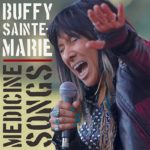 ‘Buffy Sainte-Marie, wasn’t she one of those protest singers back in the black and white days?”
‘Buffy Sainte-Marie, wasn’t she one of those protest singers back in the black and white days?”
‘Yep.’
‘And she’s still around now?’
‘Yep.’
‘So what’s she protesting about now?’
‘Exactly the same things she was protesting about back then. Been lots of fine words spoken and written about indigenous peoples across the world but nothing’s changed. We’re still fighting wars, the environment’s still being exploited by the suits and it’s still acceptable to brush aside Native Americans, Aboriginal Australians and Inuit when there’s a profit to be made. Just look at Standing Rock. Guess Buffy Sainte-Marie’s still as relevant fifty years down the line.’
Buffy thinks so as well. “Medicine Songs” is an album for these times. Some of the songs are over fifty years old and there are only two completely new songs, but “Medicine Songs” is something very special. Buffy Sainte-Marie has taken the older songs, given them new treatments for the twenty-first century and, in her words, ‘put them to work’. It’s just possible that some of them are even more relevant now. The album’s thirteen songs long, but the digital edition (which you get as a download code with the vinyl or CD) has an additional seven songs, so you get twenty songs in total (including two very different versions of “The War Racket”). Where do I start? Well, I’m going to pick a few of my personal highpoints.
The two songs that open the album embody its two main themes. “You Got to Run”, featuring Tanya Tagaq, with a barrage of floor toms and Native American choral backing vocals, emphasises positivity and cooperation, while “The War Racket” denounces the obscenity of warmongers making huge profits from conflicts that they dress up as virtuous interventions. The protest songs make up the majority of the album, but there’s enough of a positive message with songs like “Carry It On” and “Starwalker” and “Soldier Blue” which celebrate indigenous American culture, and the gorgeous, poppy “Fallen Angels”, to add some contrast to the picture.
Of the earlier songs, “My Country ‘Tis of Thy People You’re Dying”, “Universal Soldier” and “Now That the Buffalo’s Gone” are given a sixties/seventies solo acoustic treatment, while “Generation” gets a mid-tempo rock production with a military drumbeat in the breakdown. “Bury My Heart at Wounded Knee” is transformed into a rock/reggae hybrid with a heavy emphasis on the off beat and a big distorted guitar sound to punctuate the lyrics while “No No Keshagesh” is a huge production with pumping bass, raw overdriven guitars, sampled backing vocals and a lead vocal echoed by synth lines. And, if you’re more at home out on the floor, “Power in the Blood” gets the four–to-the-floor treatment with a huge production built around thunderous bass and floor toms, while “Working for the Government” is a slightly more subtle “Professional Widow”-style reworking; both stylings refresh and reinvigorate the songs. Have a listen for yourself by clicking on any of the links.
If there was ever a time for these songs to be heard, it’s now. Many of them were pertinent at the time of release but considered too controversial for airplay; songs exposing corporate greed, militarism, historical revisionism and the problems still facing the indigenous population in Canada (it’s not specifically referenced on the album, but the CD booklet features a picture from the Red Dress Project). “Medicine Songs” is about as far as you can get from the vanilla choking the airwaves at the moment (that’s a recommendation in itself) and it comes when we most need it. 2018 is shaping up as the year of the protest singer; if it’s all this good, bring it on.
“Medicine Songs” is released on True North Records (TND681) on Friday January 26,2018.
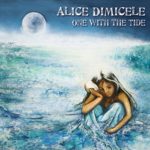 Alice DiMicele’s a highly-principled songwriter. She creates songs about the things that matter to her, whether it’s the environment, land rights of indigenous peoples or being in a relationship with an alcoholic. To these powerful themes she adds a wide range of musical stylings to create nine songs (nine song albums, is that a thing now?) that demonstrate a wide range of influences while retaining an organic, rootsy feel. If that wasn’t enough, she has a tremendous voice with a huge range and the ability to work across different styles. All of this and a John Lennon cover to close out the album. Sounds good to me.
Alice DiMicele’s a highly-principled songwriter. She creates songs about the things that matter to her, whether it’s the environment, land rights of indigenous peoples or being in a relationship with an alcoholic. To these powerful themes she adds a wide range of musical stylings to create nine songs (nine song albums, is that a thing now?) that demonstrate a wide range of influences while retaining an organic, rootsy feel. If that wasn’t enough, she has a tremendous voice with a huge range and the ability to work across different styles. All of this and a John Lennon cover to close out the album. Sounds good to me.
As much as I love the elemental, environmental themes of the album, the song that I want to hear again and again is “Lonely Alone”, a poignant ballad that tells the story of life with an alcoholic. It all fits together perfectly, from Alice’s soulful delivery (reminiscent of Etta James’ “I’d Rather Go Blind”) to the Steve Cropper-like crystal-clear guitar solo and even the prominent accordion; there’s not a note out of place. It’s followed immediately by the uplifting “Waiting” with its South African rhythms and a bit of steel pan to add a Caribbean carnival vibe to create a feeling of joy that throws the stark environmental messages into sharp contrast.
Apart from these two songs, the overall sound of the album has hints of The Band (maybe it’s the Hammond B3 and slide guitar) and some interesting string arrangements (on “The Other Side” and “Seeds”) and a lovely stripped-back version of the final song, the album’s only cover. It’s fair to say that “Imagine” isn’t my favourite song, but Alice strips away the overblown elements of the original and, with some delicate finger-picked guitar, harmony vocal and cello; can you believe it, “Imagine” with a cello solo?. It’s only a delicate touch, but the call and response of ‘brotherhood of man’ and ‘sisterhood of woman’ transforms the song completely.
“One with the Tide” is an album full of seemingly effortless performances, thought-provoking lyrics, startling contrasts and superb vocals. Favourite song? Has to be “Lonely Alone” with the perfect soul combination of a sparse arrangement, melancholy theme and Alice’s soaring vocal.
“One with the Tide” is released on Friday January 19 on Alice Otter Music (AO114).
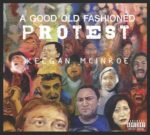 Keegan McInroe’s last album, “Uncouth Pilgrims”, was very much a troubadour’s set of songs; tales of his travels and celebrations of life. This one’s a very different beast. You can probably guess from the title that it’s full of protest songs, like the ones that Dylan, Joan Baez and Buffy Sainte-Marie used to sing in the sixties and seventies. Since the US election last year, after the initial disbelief, the references to the administration onstage from touring American bands started to become a regular thing. The odd critical song started to appear on albums, but Keegan McInroe has gone all the way. “A Good Old Fashioned Protest” is nine protest songs (well, eight songs and a poem) with media manipulation, environmental exploitation, militarism and hypocrisy firmly in its laser beam.
Keegan McInroe’s last album, “Uncouth Pilgrims”, was very much a troubadour’s set of songs; tales of his travels and celebrations of life. This one’s a very different beast. You can probably guess from the title that it’s full of protest songs, like the ones that Dylan, Joan Baez and Buffy Sainte-Marie used to sing in the sixties and seventies. Since the US election last year, after the initial disbelief, the references to the administration onstage from touring American bands started to become a regular thing. The odd critical song started to appear on albums, but Keegan McInroe has gone all the way. “A Good Old Fashioned Protest” is nine protest songs (well, eight songs and a poem) with media manipulation, environmental exploitation, militarism and hypocrisy firmly in its laser beam.
The album opens with “Talking Talking Head Blues”, a strummed acoustic backing underpinning a headlong rush through the evils afflicted on us by the current US administration (and let’s not think we can be too smug in the UK), including biased news, the surveillance society, dumbing down and smoke and mirrors. The narrative opens with Keegan waking from a dream to hear a talking head on a news show; the dream is from the last song on the album, “Keegan’s Beautiful Dream”, which has all of the anti-establishment protesters banding together to render the system impotent. The album comes full circle and the cycle starts all over again.
I’ve had a beer with Keegan; he’s a lovely guy. He’s witty, he’s well-read, he knows his music and he’s really laid-back, but here the message is anger bordering on rage at the state of the world today. He targets environmental exploitation in “Big River”, militarism in “Bombing for Peace”, hypocrisy and self-righteousness in “Bastards and Bitches” (there’s no token single swear word here to get a parental guidance sticker here, this album is full-on) and the causes of radicalisation in “Timmy Johnson’s Living Brother”. The poem “Nietzche Wore Boots” deserves a special mention; it satirises the way the plutocracy divides and rules and points the way to an apocalyptic ending that will be just another tiny event in the history of the planet. And it’s the pivot before the two songs of redemption that end the album. And they’re still protest songs, just protest songs with a positive message.
Tyrants hate the arts and people involved in the arts. They know that artists and writers and poets are free thinkers who never just accept what they’re told by the establishment. They ask awkward questions and they create works that criticise the status quo because someone has to. Keegan McInroe has done that with this album; he’s pulled together a varied bunch of songs that will pull you in with their rhythms and melodies and make you stop and think about what’s really going on in the world; maybe ask a few questions yourself. That has to be a good thing.
“A Good Old Fashioned Protest” is released on Friday January 12.
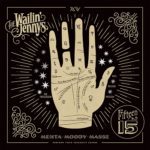 This was the first album I listened to on January 1 2018. Kind of appropriate really; after hearing so much beered-up musical stodge over the festive period, this is the perfect aural January detox to accompany the real thing. The Wailin’ Jennys (Heather Masse, Nicky Mehta and Ruth Moody) have been together fifteen years (hence the title), but this is their first album in six years. It’s worth waiting for; it’s gorgeous. They interpret nine very different songs but the common thread running through all of them is those three fabulous voices and the heartbreakingly pure harmonies. It’s possible I might mention that again at some point.
This was the first album I listened to on January 1 2018. Kind of appropriate really; after hearing so much beered-up musical stodge over the festive period, this is the perfect aural January detox to accompany the real thing. The Wailin’ Jennys (Heather Masse, Nicky Mehta and Ruth Moody) have been together fifteen years (hence the title), but this is their first album in six years. It’s worth waiting for; it’s gorgeous. They interpret nine very different songs but the common thread running through all of them is those three fabulous voices and the heartbreakingly pure harmonies. It’s possible I might mention that again at some point.
Everything is built around creating a setting for those flawless voices to deliver interpretations that are technically and emotionally perfect. Generally speaking, the musicians have a fairly light touch throughout the album; this is all about putting those three voices straight upfront and centre. When full string band arrangements are used, they tend to build up in layers to push the song to a higher level, which works particularly well on the timely cover of Tom Petty’s “Wildflowers” and the Jane Siberry song, “The Valley”. “Boulder to Birmingham”, Emmylou Harris and Bill Danoff’s plaintive elegy to Gram Parsons has a full band sound with some lovely two-guitar picking and percussive upright bass; none of it threatens to overwhelm the vocals.
For all the subtle and delicate playing, the a cappella or virtually a cappella material that really shines brightly. Paul Simon’s “Loves Me like a Rock” gets the handclap and fingerpop treatment, Dolly Parton’s “Light of a Clear Blue Morning” begins with a solo vocal before the stunning harmonies join, but the best is saved till last. The album’s final song is an a cappella cover of Hank Williams’ “Weary Blues from Waitin’” which not only has the expected beautiful three-part harmonies but features some incredibly precise three-part glissando harmonies. I have honestly never heard that done with such precision.
So now you’re going to ask if I like it, yeah? What a great way to start the year. But you don’t have to take my word for it; a click on any of those song links will take you to Spotify where you can hear it for yourself.
“Fifteen” is released on True North Records on Friday January 5 2018.
Let’s start 2018 in the traditional way by dusting off the Riot Squad crystal ball and having a peek into the next few months to see what we have to look forward to. As always, in no particular order.
 After an absence of a couple of years to deal with serious health issues, Phil Burdett’s back in business again and firing out creative sparks in all directions. The action starts on Saturday January 27th at The Dickens in Southend with the launch gig for Phil’s latest album, “Psychopastoral”. He’ll be backed by the sublime Phil Burdett Group and the support band will be Winter. But that’s just the start; Phil has big plans for the rest of the year, including recording a double album of the songs written while he was in hospital, working on an art/film project and completing a book of poetry and a novel. We’ve got an interview with him coming up in the near future, so just watch this space. (Breaking news on this, Phil’s currently looking for a new venue for the gig on the 27th after The Dickens closed down over Christmas).
After an absence of a couple of years to deal with serious health issues, Phil Burdett’s back in business again and firing out creative sparks in all directions. The action starts on Saturday January 27th at The Dickens in Southend with the launch gig for Phil’s latest album, “Psychopastoral”. He’ll be backed by the sublime Phil Burdett Group and the support band will be Winter. But that’s just the start; Phil has big plans for the rest of the year, including recording a double album of the songs written while he was in hospital, working on an art/film project and completing a book of poetry and a novel. We’ve got an interview with him coming up in the near future, so just watch this space. (Breaking news on this, Phil’s currently looking for a new venue for the gig on the 27th after The Dickens closed down over Christmas).
 While we’re on the subject of grand ambitions, let me tell you about Martin Harley. He’s doing a three week tour of the UK with upright bass player extraordinaire Daniel Kimbro. They work together perfectly as a duo, both live and in the studio. The songwriting’s first class, the playing’s perfect and the harmonies are superb; even the chat between songs is interesting and often hilarious. Anyway, one of Martin’s ambitions is to play the Union Chapel in Islington, so he’s booked it for the last night of the tour on Saturday March 10th and he’s promoting the gig himself. It’s the perfect venue for Martin’s music and the Riot Squad will be out in force to support such a brave venture.
While we’re on the subject of grand ambitions, let me tell you about Martin Harley. He’s doing a three week tour of the UK with upright bass player extraordinaire Daniel Kimbro. They work together perfectly as a duo, both live and in the studio. The songwriting’s first class, the playing’s perfect and the harmonies are superb; even the chat between songs is interesting and often hilarious. Anyway, one of Martin’s ambitions is to play the Union Chapel in Islington, so he’s booked it for the last night of the tour on Saturday March 10th and he’s promoting the gig himself. It’s the perfect venue for Martin’s music and the Riot Squad will be out in force to support such a brave venture.
 Another musical partnership we’ve been following for some time is Dean Owens and Will Kimbrough. Will’s guitar playing is in high demand; I lost count of the albums I reviewed in 2017 that featured Will’s playing, but he’s built a special relationship with Dean that’s led to a full-scale collaboration on their latest album “Southern Wind”. We’ve had some sneak previews here and we’ll be reviewing it in the next couple of weeks ahead of the official release date of Friday February 16 on At The Helm Records. You’ll love it.
Another musical partnership we’ve been following for some time is Dean Owens and Will Kimbrough. Will’s guitar playing is in high demand; I lost count of the albums I reviewed in 2017 that featured Will’s playing, but he’s built a special relationship with Dean that’s led to a full-scale collaboration on their latest album “Southern Wind”. We’ve had some sneak previews here and we’ll be reviewing it in the next couple of weeks ahead of the official release date of Friday February 16 on At The Helm Records. You’ll love it.
 2017 saw the release of the ‘lost’ PP Arnold album and the announcement she’s going to be making an album this year at Paul Weller’s Black Barn studio. It’s fantastic that “The Turning Tide” has finally been found, but even better that Pat is actually making original music again. And there’s plenty of speculation round the water cooler here at Riot towers about possible guest appearances and collaborations on the new album.
2017 saw the release of the ‘lost’ PP Arnold album and the announcement she’s going to be making an album this year at Paul Weller’s Black Barn studio. It’s fantastic that “The Turning Tide” has finally been found, but even better that Pat is actually making original music again. And there’s plenty of speculation round the water cooler here at Riot towers about possible guest appearances and collaborations on the new album.
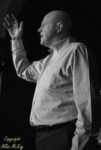 Finally, and this is specifically a London thing for the moment, late January will see the launch of Talentbanq, the latest venture for Ray Jones. Ray, former Development Director at Time Out has a passion for music that would shame most journalists and he’s always been willing to put a lot of time and effort into promoting new talent. Now that he’s no longer at Time Out he’s focussing his energies on promoting up-and-coming artists with Talentbanq. We’re still waiting for more details, but we do know that it’s going to be an interesting ride.
Finally, and this is specifically a London thing for the moment, late January will see the launch of Talentbanq, the latest venture for Ray Jones. Ray, former Development Director at Time Out has a passion for music that would shame most journalists and he’s always been willing to put a lot of time and effort into promoting new talent. Now that he’s no longer at Time Out he’s focussing his energies on promoting up-and-coming artists with Talentbanq. We’re still waiting for more details, but we do know that it’s going to be an interesting ride.


